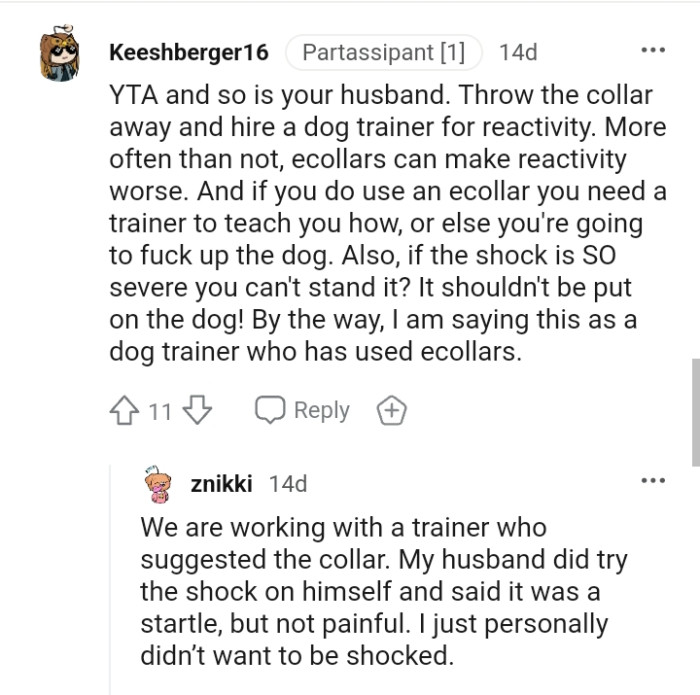Woman Refuses to Test the Shock Collar Her Husband Bought for Their Dog; He Says They Won’t Use It Then
For humans, physical development takes a long time. However, dogs seem to mature almost instantly in our sight.
Your puppy may be an adorable little creature one morning, but by the next, it may begin to behave more like an adolescent, complete with mood swings and behavioral changes. If we want to be responsible dog owners, we need to understand the significance of sexual maturity in this process.
Everyone is aware of what occurs to humans during puberty. Dogs are exempt from facial hair and acne, but they do undergo major hormonal shifts that can affect their behavior.
For male and female puppies, there are distinct differences. So you'll be a better dog owner if you know when sexual maturity occurs in puppies and what that implies for your canine.
You can make more informed decisions about your dog's well-being with this information at your disposal. Being aware of the scientific principles underlying sexual maturity in pups will help you comprehend your puppy's changing and occasionally perplexing behavior.
The OP in today's story has a well-behaved and trained dog who is going through puberty and exhibiting different behaviors. When he sees another dog, he lunges and barks, trying to play, and when people come over, he jumps up at them.
The OP has tried many things to stop this behavior until her husband got a shock collar.
And Now, the OP's Husband Wants Her to Try Out the Shock Collar First

The OP's Husband Said If She's Not Willing to Shock Herself, Then She Can’t Shock the Dog

Dog training collars, e-collars, and electric collars are other names for shock collars. These training tools first warn your canine with a beep or vibration before shocking him remotely if he continues the undesirable behavior.
The purpose of the warning is to get your dog to stop acting out before a shock is required by teaching him to associate the beep with the shock. Here is what Redditors had to say about the Reddit story.
Understanding Training Resistance
The reluctance to test the shock collar reflects a broader psychological principle known as cognitive dissonance. When one’s values conflict with actions, discomfort arises, prompting a reconsideration of choices.
Dr. Leon Festinger's theory of cognitive dissonance suggests that individuals will often change their beliefs or attitudes to align with their actions in order to reduce discomfort.
For this woman, her refusal may indicate a strong belief in humane treatment for animals, advocating for training methods that nurture rather than punish.
Shock Collars Are a Poor Form of Punishment

The Psychology of Fear in Training
According to research published in the Journal of Applied Animal Welfare Science, the use of shock collars can evoke fear-based responses in dogs, which may lead to anxiety and aggression.
Dr. John Wright, an animal behaviorist, emphasizes that training methods should prioritize positive reinforcement rather than punitive measures, as fear can hinder a dog's ability to learn effectively.
Understanding animal behavior through a psychological lens can lead to better outcomes, fostering trust and healthy relationships between pets and their owners.
Understanding the Ethics of Pet Training
Dr. Mark Taylor, an animal behaviorist, emphasizes the importance of ethical considerations when training pets.
Research shows that methods involving pain or fear can lead to long-term behavioral issues and damage the human-animal bond.
Understanding humane training techniques is crucial for responsible pet ownership.
Consider Other Solutions Besides a Shock Collar

This Redditor Believes the OP's Husband Is a Cop

It Seems the OP Is Not Actually Against the Dog Shock Collar

Research indicates that humans often project their feelings onto their pets, particularly regarding training methods. A study from the University of Pennsylvania highlights how owners' beliefs about discipline can influence their dogs' behavior.
The discomfort experienced by the woman in the article reflects a deeper psychological principle: empathy. When individuals empathize with their pets, they are less likely to endorse harsh training techniques.
This emotional connection is crucial in fostering a positive environment for both the pet and the owner.
The refusal to test a shock collar reflects deeper ethical concerns about animal welfare.
Studies indicate that many pet owners are increasingly aware of the psychological impacts of training methods on their animals.
Encouraging discussions about humane training can foster better practices and enhance the pet-owner relationship.
This Redditor Was for the YTA Before Changing Their Mind

You Need a Trainer to Teach You How to Properly Use a Shock Collar

OP Has a Scary Husband

The Role of Empathy in Pet Training
Empathy plays a significant role in how we interact with animals. According to Dr. Frans de Waal, a primatologist, humans possess an innate ability to empathize, which can extend to our relationships with pets.
His research shows that understanding an animal's emotional state can lead to more effective training methods, emphasizing care over control.
For dog owners, fostering empathy might encourage the use of humane training techniques, ultimately resulting in a happier, more well-adjusted pet.
The Role of Empathy in Pet Ownership
Empathy is a crucial component of responsible pet ownership.
Research highlights that understanding an animal's emotional state can lead to better training outcomes and stronger bonds.
Encouraging pet owners to consider their animals' perspectives can improve training effectiveness and overall pet welfare.
They Stop and Reevaluate Their Life Choices

That Seems Incredibly Unnecessary for a Dog

For This Redditor, the Answer to All This Is a Divorce

Behavioral psychologists assert that fear-based training can lead to a cycle of mistrust. A study in the journal Applied Animal Behaviour Science found that dogs trained with aversive methods exhibit increased signs of stress.
To combat this, owners should consider positive reinforcement strategies, such as clicker training, which research shows can be more effective in shaping desired behaviors without inducing fear.
Implementing these techniques can enhance the bond between owner and pet, paving the way for a more harmonious relationship.
Therapists often recommend that pet owners engage in training classes that emphasize positive reinforcement over punitive measures.
Studies indicate that these methods lead to more successful and lasting behavior change in pets.
Promoting positive training techniques can create a more harmonious relationship between pets and their owners.
Although many dog owners find the notion of shocking their dogs repulsive, these collars can be effective tools for behavior modification when used properly. But as a Redditor mentioned in the comments, you'll need a dog trainer to show you how to use it correctly, so you don't end up hurting your furry companion.
Still, there are other methods you can use to correct a dog's behavior besides shocking them.
Psychological Analysis
This situation illustrates the ethical dilemmas faced by pet owners regarding training methods.
It's important for individuals to consider the emotional impact of their training choices and prioritize humane techniques that foster trust and connection.
Analysis generated by AI
Analysis & Alternative Approaches
Overall, the ethics of pet training are critical to fostering healthy relationships between pets and their owners.
Psychological insights reveal that empathetic and humane training methods enhance both animal welfare and owner satisfaction.
By prioritizing ethical practices, pet owners can ensure the well-being of their animals and strengthen their bonds.
In summary, the psychological insights into pet training highlight the importance of empathy, positive reinforcement, and awareness of emotional responses. Research shows that humane training techniques foster healthier relationships between pets and their owners.
As Dr. John Paul Scott's studies suggest, building trust through understanding and compassion not only benefits the animal but also enriches the owner's experience. By embracing these principles, we can create a more nurturing environment for our beloved pets while aligning our actions with our values.



